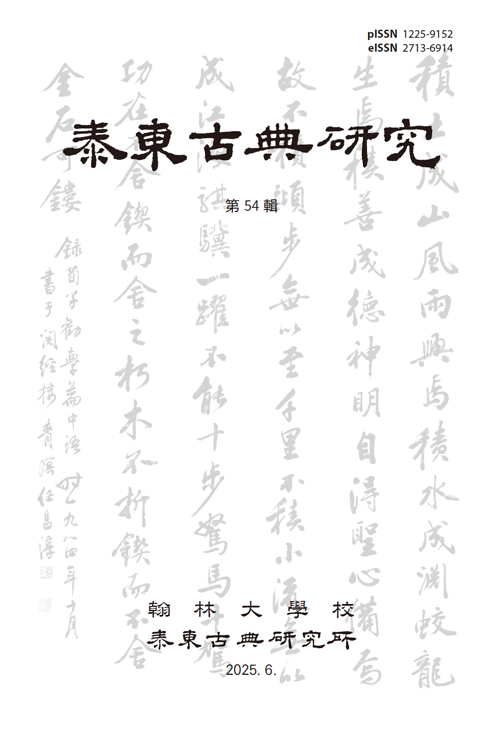- 영문명
- The Concept of Filial Piety and Obedience (Hyo-sun) as a Practice-Based Ethical Ideal in Silla Buddhism and Its Contemporary Significance: Focusing on Wonhyo’s Beommang-gyeong Bosalgye Bon Sagi and Taehyeon’s Beommang-gyeong Gojeokgi
- 발행기관
- 한림대학교 태동고전연구소
- 저자명
- 이해임(Haeim LEE)
- 간행물 정보
- 『태동고전연구』제54집, 47~83쪽, 전체 37쪽
- 주제분류
- 인문학 > 문학
- 파일형태
- 발행일자
- 2025.06.30

국문 초록
이 연구는 유교와 불교의 효순 개념이 각기 독자적인 사유 체계 속에서 어떻게 형성되고 변용되었는지를 분석하고, 이를 바탕으로 현대적 윤리 및 사회 정책으로 확장될 가능성을 탐색하였다. 먼저, 남북조 시대 불교의 『범망경』이 유교적 효 윤리를 수용하여 불교 계율 체계에 통합하는 과정을 살펴보고, 이를 신라불교의 원효와 태현이 어떻게 수행 윤리로 발전시켰는지를 고찰하였다. 원효는 효순을 계율의 전수와 실천을 통해 완성되는 보편적 수행 윤리로 확장하였고, 태현은 혈연적 효를 넘어 모든 존재에 대한 자비와 평등을 실천하는 승의적 효로 심화시켰다. 이러한 논의를 바탕으로 본 연구는 유교와 불교의 효순 개념이 단순한 전통 윤리를 넘어 사회적 연대와 공동체 윤리로 확장될 수 있음을 제안하며, 유네스코의 지속 가능한 교육과 연계한 ‘GLOCAL 효순 프로젝트’를 정책적 모델로 제안하였다. 본 연구는 동아시아 전통윤리의 현대적 재해석 가능성을 열고, 윤리 교육, 사회 복지, 디지털 윤리 실천을 통합하는 실천적 방향을 제시했다는 점에서 학술적·사회적 의의를 가진다.
영문 초록
This study examines how the Confucian and Buddhist concepts of Hyo(filial piety) and Sun(obedience) have been independently shaped and transformed within their respective philosophical frameworks, and explores their potential application in contemporary ethics and social policy. It first analyzes how the Fanwang jing 梵網經 integrated Confucian filial ethics into the Buddhist disciplinary system in China. It then investigates how this integration was further developed into a practical ethic of Buddhist practice by Silla monks Wonhyo and Taehyeon. Wonhyo expanded the concept of filial piety and obedience beyond familial duty, framing it as a universal practice of precept transmission and observance. Taehyeon deepened this by advocating for transcendent filial piety(Seungui Hyo) and obedience, which emphasizes compassion and equality toward all beings beyond blood relations. Building on these insights, this study proposes that the concept of Hyo-Sun can evolve from a traditional familial ethic into a foundation for social solidarity and communal ethics. To this end, the study presents the “GLOCAL Hyo-Sun Project” as a policy model aligned with UNESCO’s Sustainable Development Goals(SDG4) for lifelong learning. This research offers academic and social significance by opening new possibilities for reinterpreting East Asian traditional ethics in the modern context and proposing integrated approaches to ethical education, social welfare, and digital ethics practice.
목차
1. 머리말
2. 『범망경』 출현 전후 유교와 불교의 갈등과 조화
3. 효순의 두 가지 유래 : 『효경』과 『주례』
4. 원효의 『범망경보살계본사기』 : 수계와 성불의 보편 윤리
5. 태현의 『범망경고적기』 : 은혜와 공경의 공동체 윤리
6. 효순 개념 중심의 유네스코 문화콘텐츠제작 관련 정책 제안
7. 맺음말
참고문헌
키워드
해당간행물 수록 논문
참고문헌
최근 이용한 논문
교보eBook 첫 방문을 환영 합니다!

신규가입 혜택 지급이 완료 되었습니다.
바로 사용 가능한 교보e캐시 1,000원 (유효기간 7일)
지금 바로 교보eBook의 다양한 콘텐츠를 이용해 보세요!



